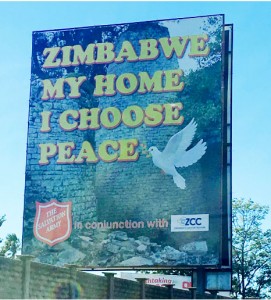Zimbabwe: The 2018 Elections and their Aftermath
Introduction
 After the coup in November 2017, a central part of the coup leader’s strategy was to move beyond the shadow of the coup through an election process that was seen to be peaceful and credible. As the Presidential spokesperson explained it, for ED Mnangagwa and his team July 30 ‘was not about winning votes qua votes, but about securing re-‐engagement and the myriad benefits flowing therefrom’.1 Thus this ‘open for business’ mantra was accompanied by selective electoral reforms. These included: The introduction of the BVR voting system; the ensuring of a more peaceful and tolerant electoral environment; and an invitation to a wide range of international observers including the EU, US, SADC, AU, and the Commonwealth to monitor and report on the election. As part of the narrative of international re-‐engagement, national unity and reconciliation that marked his discourse since the coup, Mnangagwa also conducted a series of meetings with minority communities. In June, Chiwenga met with the Asian business community, and In July the Zanu PF President met with the representatives of the white community and invoked the language of reconciliation that Mugabe deployed in the immediate post 1980 period: We should cease to talk about who owns farms in terms of colour.
After the coup in November 2017, a central part of the coup leader’s strategy was to move beyond the shadow of the coup through an election process that was seen to be peaceful and credible. As the Presidential spokesperson explained it, for ED Mnangagwa and his team July 30 ‘was not about winning votes qua votes, but about securing re-‐engagement and the myriad benefits flowing therefrom’.1 Thus this ‘open for business’ mantra was accompanied by selective electoral reforms. These included: The introduction of the BVR voting system; the ensuring of a more peaceful and tolerant electoral environment; and an invitation to a wide range of international observers including the EU, US, SADC, AU, and the Commonwealth to monitor and report on the election. As part of the narrative of international re-‐engagement, national unity and reconciliation that marked his discourse since the coup, Mnangagwa also conducted a series of meetings with minority communities. In June, Chiwenga met with the Asian business community, and In July the Zanu PF President met with the representatives of the white community and invoked the language of reconciliation that Mugabe deployed in the immediate post 1980 period: We should cease to talk about who owns farms in terms of colour.
We should cease talking about that. A farmer-‐black farmer, a white farmer-‐is a Zimbabwean farmer. We should begin to develop a culture among our people to accept that we are one.2
The opposition, led by the largest party the MDC Alliance and its young leader Nelson Chamisa, made it clear from early on in its election campaign that there were serious problems in the election process that had not been dealt with. The problem areas included the partisan status of the Zimbabwe Election Commission, the late release of the voter’s role, lack of transparency around the printing of the ballot papers, and the lack of equal access to the public media. Moreover Chamisa stated throughout his campaign that his party would not accept any result other than his Presidential victory. In addition to these challenges the opposition was also caught up in the outcome of a bitter succession battle after the death of Morgan Tsvangirai which resulted in yet another split in the MDC. Chamisa’s victory over Thoko Khupe in a political battle marred by violence, misogyny and, at the very least, a questionable constitutionality, once again marred the image of the opposition.
Notwithstanding the differences between the two major parties their election manifestos converged around the need for macro-‐economic stabilisation and market-‐based reforms. Both were competing for international financial approval and investment promises.
The full pdf report can be downloaded here.
—
1 Under the Eaves with Igomombe, ‘Zimbabweans armed with ideas’. Herald, 1 September 2018.
2 ED meets White Community. Sunday Mail, 22 July 2018. ZBC, “We are all Zimbabweans, VP tells Indian community”, 8 July 2018.











![PASSOP, an NGO supporting Zimbabweans in De Doorns, is banned from entering the IDP camp, and here holds a meeting with them through the fence! They deliver “the Zimbabwean” newspaper – news from home read avidly. [30 May 2010] PASSOP, an NGO supporting Zimbabweans in De Doorns, is banned from entering the IDP camp, and here holds a meeting with them through the fence! They deliver “the Zimbabwean” newspaper – news from home read avidly. [30 May 2010]](https://solidaritypeacetrust.org/wp-content/gallery/a-fractured-nation/thumbs/thumbs_image117.jpg)
